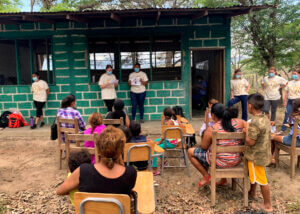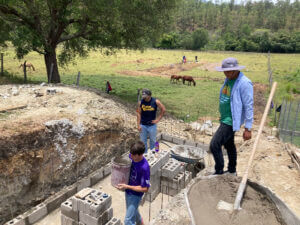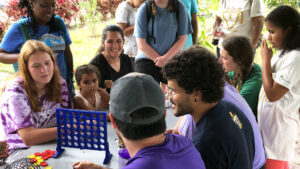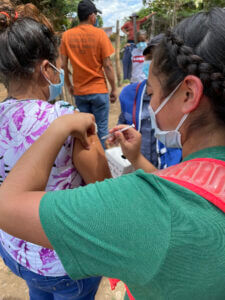
In a country where more than 50 percent of the population lives in poverty and an estimated 150,000 children are orphans, hope is a precious commodity.
A group of nursing and engineering students from ACU traveled to Honduras in May to work with Living Hope, a nonprofit ministry focusing on families, children and abandoned or abused girls.
The engineering students designed an onsite wastewater treatment system for a new children’s home in the town of Gualaco, while the nursing students provided resources to educate area residents on sanitation and hygiene.

Both groups were part of ACU’s Wildcat Academics on Mission (WAM), a program that turns classwork into a real-world missions experience.
Directed by ACU’s Halbert Center for Missions and Global Service, the program allows students to conduct research or design a hands-on project within their academic major and then spend three weeks abroad with their classmates bringing the project to life.
In the process, they earn 3 credit hours in their chosen field of study and another 3 credit hours in missions from the Department of Bible, Missions and Ministry. The cost of the program is funded by donors, so participants pay only for their tuition.
Nate Hartin from Round Rock, Texas, was one of the engineering students who helped design a septic system for Lynn’s Casa, a home for orphaned girls.
Hartin was excited about the opportunity to serve as part of his junior clinic course.
“There aren’t a whole lot of chances to tie in coursework and real-world applications other than internships,” said Hartin. “The fact that the project was benefiting a girls’ home was the icing on the cake.”
The students worked on a United Nations-approved design during the semester and then traveled to Gualaco to help install it. They learned that not everything goes as planned when you are working in the context of a developing country, said Dodd Roberts, director of the Halbert Center.

Hartin said obstacles such as translation issues and COVID-19 precautions slowed down the work.
“However, the locals’ work ethic and willingness to simply start working in spite of all the setbacks was probably the best part of the trip for me,” he said.
“For example, the excavation crew simply never showed up, so we spent a few days trying to source one,” Hartin said. “After a few days, the local preacher, who was head of construction, just went out and hired people from the community to come dig out the site by hand. The tank itself was about 1,600 square feet, and that doesn’t include the field, where the trenches were 7 feet deep and 50 feet long. It was crazy and really awe-inspiring to see everyone come together to help.”
Because of the complications, the construction was not completed during the students’ time in Honduras, but engineering plans and specifications were left behind so the local organization could finish the project.
“This was actually a great lesson, and it empowered the local people as they ended up doing a great deal of the work,” Roberts said.

The nursing students joined the trip at the request of a local physician, who asked them to develop an education program for local villagers focused on clean water, sanitation and hygiene.
Addy Boston, a nursing major from Ennis, Texas, said she and her classmates spent the semester at ACU preparing a teaching project based on hygiene and healthy living, with topics such as nutrition and the importance of hand washing. Their project came to life in Honduras.
“We traveled to many different villages around where we stayed in Gualaco to present these projects to communities and children in schools,” she said. “We also worked with a local clinic to administer influenza vaccines and assist the doctor in performing other basic care for those who needed it.”
One of her favorite activities, she said, was spending time with the Honduran girls who had found a safe haven at Living Hope. “We swam, ate and played with them a few days a week and really grew to love them,” she said.
Both groups left with a new understanding of the value of finding commonality with people who live in a different culture.
The relationships they formed were life-changing.
“The group I went with and the friends I made in Honduras are all people who have taught me something about life and have shown me Jesus in some way,” said Boston. “We need community, and this trip was just another example of God’s tangible presence in our lives when we lean into the relationships around us.”
Learn more about the ACU Department of Engineering and Physics
Learn more about the ACU School of Nursing
– Robin Saylor
Nov. 8, 2021
